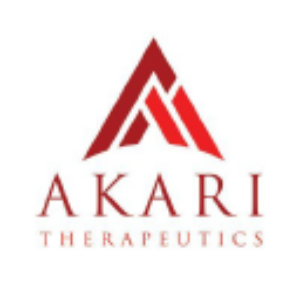Akari Therapeutics’ Preclinical Data Demonstrates the Potential of its Novel ADC Spliceosome Modulating Payload, PH1
Rhea-AI Summary
Akari Therapeutics (NASDAQ: AKTX) has announced promising preclinical data for its novel ADC spliceosome modulating payload, PH1, targeting hormone refractory prostate cancer. The data demonstrates PH1's ability to suppress AR-V7 receptor levels, which drives metastatic castration resistant prostate cancer (mCRPC) progression.
The research showed PH1's effectiveness in both hormone-refractory and hormone-sensitive prostate cancer models. In hormone-sensitive cases, PH1 showed additive effects when combined with existing treatments like Xtandi and Erleada. This suggests potential for developing first-line combination therapies and addressing the significant unmet need in ARPI-resistant cases, where current treatment options are limited.
Positive
- Demonstrated ability to suppress AR-V7 receptor levels in hormone-refractory prostate cancer
- Showed effectiveness as single agent and additive effects with existing treatments in hormone-sensitive cases
- Potential to develop first-line combination therapies with major drugs like Xtandi ($6B/year) and Erleada ($3B/year)
- Addresses significant unmet need in ARPI-resistant hormone refractory patients
Negative
- Still in preclinical stage, requiring extensive further testing
- Data yet to be presented at scientific conference for peer review
- Potential competition from existing treatments in hormone-sensitive cases
News Market Reaction – AKTX
On the day this news was published, AKTX gained 45.96%, reflecting a significant positive market reaction. Argus tracked a peak move of +39.3% during that session. Our momentum scanner triggered 37 alerts that day, indicating elevated trading interest and price volatility. This price movement added approximately $13M to the company's valuation, bringing the market cap to $40M at that time. Trading volume was exceptionally heavy at 13.1x the daily average, suggesting very strong buying interest.
Data tracked by StockTitan Argus on the day of publication.
Data highlights ability of Akari’s ADC payload, PH1, to suppress the levels of the AR-V7 receptor that is responsible for driving hormone refractory prostate cancer progression
No current therapies have proven to be effective in AR-V7 driven tumors
BOSTON and LONDON, Sept. 24, 2025 (GLOBE NEWSWIRE) -- Akari Therapeutics, Plc (Nasdaq: AKTX), an oncology biotechnology company developing novel payload antibody drug conjugates (ADCs), today announced key preclinical data demonstrating the potential of its novel antibody drug conjugate (ADC) spliceosome modulating payload, PH1, for the treatment of tumors fueled by alternative splicing-drivers, such as the Androgen Receptor splice variant 7 (AR-V7) in prostate cancer.
AR-V7 is a key driver for progression of metastatic castration resistant prostate cancer (mCRPC). During progression of hormone-sensitive prostate cancer, many patients fail to respond to current first-line therapies known as Androgen Receptor Pathway Inhibitors (ARPIs), which include enzalutamide (Xtandi,
As referenced in the Company’s recent patent filing, preclinical data demonstrated that Akari’s ADC payloadPH1 is able to suppress the expression levels of the AR-V7 receptor in a hormone-refractory mCRPC model called 22Rv1. As a control, ARPIs had no effect on AR-V7 receptor expression in these experiments, which was expected given the refractory nature of these prostate cancer cell lines.
Surprisingly, in a different model, of hormone-sensitive LnCAP cells that express high levels of normal Androgen Receptor (i.e. ARPI sensitive) and lack AR-V7, PH1 demonstrated a benefit as a single agent, and additive effect when combined with either Xtandi or Erleada. The Company believes this combined efficacy data may potentially lead to the development of robust first-line combination regimens of Xtandi or Erleada with a PH1 payload conjugated ADC (PH1 ADC) to target prostate cancer that is sensitive to ARPIs. As progression is often linked to AR-V7 expression, and PH1 reduces AR-V7 expression, it is hypothesized that the combination of ARPI plus PH1 ADCs may slow the development of resistance and AR-V7-driven tumor progression which typically occurs after patients progress on Xtandi or Erleada. Akari has plans to test this hypothesis using PH1 ADCs against different prostate cancer targets in future research.
Abizer Gaslightwala, President and Chief Executive Officer of Akari Therapeutics commented, “We believe these compelling preclinical data support the rationale for Akari to develop a novel ADC with our PH1 spliceosome-modulating payload targeting prostate cancer either alone or in partnership with potential partners. Our goal is to develop the first ADC therapeutic in prostate cancer, either as a first-line combination therapy with ARPIs or a second-line therapy post ARPI failures in tumors driven by AR-V7. We are excited to continue to advance this novel spliceosome modulating payload to drive robust anti-cancer biological mechanisms to treat difficult alternative splicing-driven tumors, for which there are currently no effective treatment options today.”
The Company plans to present the preclinical data at an upcoming scientific conference.
About Akari Therapeutics
Akari Therapeutics is an oncology biotechnology company developing next-generation spliceosome payload antibody drug conjugates (ADCs). Utilizing its innovative ADC discovery platform, the Company has the ability to generate ADC candidates and optimize them based on the desired application to any target of interest. Akari’s lead candidate, AKTX-101, targets the Trop2 receptor on cancer cells and with a proprietary linker, delivers its novel PH1 payload directly into the tumor. Unlike current ADCs that use tubulin inhibitors and DNA damaging agents as their payloads, PH1 is a novel payload that is a spliceosome modulator designed to disrupt RNA splicing within cancer cells. This splicing modulation has been shown in preclinical animal models to induce cancer cell death while activating immune cells to drive robust and durable activity. In preclinical studies, AKTX-101 has shown to have significant activity and prolonged survival, relative to ADCs with traditional payloads. Additionally, AKTX-101 has the potential to be synergistic with checkpoint inhibitors and has demonstrated prolonged survival as both a single agent and in combination with checkpoint inhibitors, as compared to appropriate controls. The Company is generating validating data on its novel payload PH1 to continue advancing its lead asset, as well as other undisclosed targets with this novel payload.
For more information about the Company, please visit www.akaritx.com and connect on X and LinkedIn.
Cautionary Note Regarding Forward-Looking Statements
This press release includes express or implied forward-looking statements within the meaning of Section 27A of the Securities Act of 1933, as amended, and Section 21E of the Securities Exchange Act of 1934, as amended, about the Company that involve risks and uncertainties relating to future events and the future performance of the Company. Actual events or results may differ materially from these forward-looking statements. Words such as “will,” “could,” “would,” “should,” “expect,” “plan,” “anticipate,” “intend,” “believe,” “estimate,” “predict,” “project,” “potential,” “continue,” “future,” “opportunity” “will likely result,” “target,” variations of such words, and similar expressions or negatives of these words are intended to identify such forward-looking statements, although not all forward-looking statements contain these identifying words. Examples of such forward-looking statements include, but are not limited to, express or implied statements regarding the ability of the Company to advance its product candidates for the treatment of cancer and any other diseases, and ultimately bring therapies to patients. These statements are based on the Company’s current plans, estimates and projections. By their very nature, forward-looking statements involve inherent risks and uncertainties, both general and specific. A number of important factors, including those described in this communication, could cause actual results to differ materially from those contemplated in any forward-looking statements. Factors that may affect future results and may cause these forward-looking statements to be inaccurate include, without limitation: the Company’s need for additional capital; the potential impact of unforeseen liabilities, future capital expenditures, revenues, costs, expenses, earnings, synergies, economic performance, indebtedness, financial condition and losses on the future prospects, business and management strategies for the management, expansion and growth of the business; risks related to global as well as local political and economic conditions, including interest rate and currency exchange rate fluctuations; potential delays or failures related to research and/or development of the Company’s programs or product candidates; risks related to any loss of the Company’s patents or other intellectual property rights; any interruptions of the supply chain for raw materials or manufacturing for the Company’s product candidates, including as a result of potential tariffs; the nature, timing, cost and possible success and therapeutic applications of product candidates being developed by the Company and/or its collaborators or licensees; the extent to which the results from the research and development programs conducted by the Company, and/or its collaborators or licensees may be replicated in other studies and/or lead to advancement of product candidates to clinical trials, therapeutic applications, or regulatory approval; uncertainty of the utilization, market acceptance, and commercial success of the Company’s product candidates; risks related to competition for the Company’s product candidates; and the Company’s ability to successfully develop or commercialize its product candidates. While the foregoing list of factors presented here is considered representative, no list should be considered to be a complete statement of all potential risks and uncertainties. More detailed information about the Company and the risk factors that may affect the realization of forward-looking statements is set forth in the Company’s filings with the SEC, copies of which may be obtained from the SEC’s website at www.sec.gov. The Company assumes no, and hereby disclaims any, obligation to update the forward-looking statements contained in this press release except as required by law.
Investor Relations Contact
JTC Team, LLC
Jenene Thomas
908-824-0775
AKTX@jtcir.com








